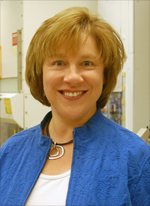Purdue to help create new interdisciplinary science curriculum
2011-09-19
Purdue University is part of a team of four universities chosen to participate in a $1.8 million Howard Hughes Medical Institute project to create and share effective models for teaching interdisciplinary science, with Purdue faculty focusing on transforming the chemistry curriculum.
The four-year National Experiment in Undergraduate Science Education, or NEXUS, will develop resources for a national basic science curriculum for premedical and prehealth students.
Marc Loudon, the Cwalina Distinguished Professor of Medicinal Chemistry and Purdue coordinator for the project, said there is a national need for greater biology focus in the physics, mathematics and chemistry courses taken by prehealth students in order to better prepare them to become interdisciplinary scientists and clinicians.
"Scientists have become accustomed to working across disciplinary boundaries, but the basic science classes in mathematics, physics and chemistry offered to biology students by many universities have not evolved as rapidly as the biological sciences themselves," said Loudon who also serves on the project's national executive steering committee. "We need to take a fresh look at the way we teach these sciences to students interested in biological sciences. We need to weed out less relevant topics, teach the more relevant topics more thoroughly and make sure that students understand the relevance of these sciences to biology - all while maintaining the intellectual rigor for which courses in these areas are well known."
Howard Hughes Medical Institute, or HHMI, selected Purdue; the University of Maryland, Baltimore County; the University of Maryland, College Park; and the University of Miami to collaborate on the project. Each institution is creating a different aspect of the curriculum, including new courses and ways of assessing how well they work. The schools will create interdisciplinary modules that can be dropped into an existing course or integrated into the redesign of an entire program. In addition, each school will implement at least part of the curriculum developed by the other three universities.
Purdue is revising the introductory chemistry courses to include more biological chemistry. In addition to Loudon, professors working on the curriculum include Jean Chmielewski, the A.W. Kramer Distinguished Professor of Chemistry; Christine Hrycyna, an associate professor of
chemistry; and David Sanders, an associate professor of biological sciences.Loudon teaches the organic chemistry course for prepharmacy students in the College of Pharmacy and is working on developing the organic chemistry portion with Chmielewski, who teaches the organic chemistry courses for premedical, preveterinary and other students interested in biological sciences.
Hrycyna created a one-semester general chemistry course for prepharmacy students that uses biological examples to illustrate the chemistry concepts. The group plans to evolve this course into the general chemistry course taken by students in the biological sciences. Hrycyna also is developing a one-semester biochemistry course to serve the same group of students.
Sanders, who is the chair of the biological sciences curriculum committee at Purdue, will work with the team on the biology portions of the curriculum.
Other professors participating in the project include Dennis Minchella, associate dean for undergraduate education in the College of Science; Marcy Towns, a professor of chemical education; and Trevor Anderson, an associate professor of chemical education, who will work on project assessment.
Source: Purdue University News Service

Jean Chmielewski
Alice Watson Kramer
Distinguished Professor
Organic Chemistry &
Chemical Biology

Christine Hrycyna
Associate Professor
Biochemistry

Marcy Towns
Professor